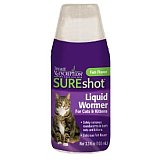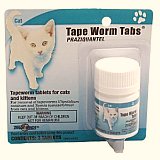How To Treat Worms In Cats

The three most common types of worms in cats are ringworms, roundworms and tapeworms. These worms are usually transmitted through a contaminated enviroment or an infected animal. If left untreated worms can have a negative effect on your cat's health. Below we will discuss how to treat theses three types of worms in cats.
Ringworm
Ringworm is a fungal infection and not actually a physical worm. This infection can be transmitted from your cat to you and affects your cat's skin, hair and nails. Patches of hair loss, dry flaky skin,and excessive shedding are all signs of ringworms. Once your cat has ringworms his or her grooming supplies will also become contaminated and will have to be replaced.Your vet will conduct several test to diagnose ringworms, he will proform a fungal culture test by removing some hairs and ringworm scales from your cat and examining them.
Ringworms are treated by either a oral or topical cream treatment or a combination of both, depending on the severity of the infection. A lime sulfur topical treatment is usually prescribe by your vet and sometimes an anti fungal oral drug, such as Griseofulvin.Your vet may recommend that you clip your cat's nails, since ringworms can also affect their nails, and to shave your cat if he/she is a long haired cat, so that it's much easier to treat the ringworms.
Since this type of worms in cats can also contaminate your environment you will need to throughly disinfect your home. Steam clean your carpets,, couches and mattress. Replace all of your pets grooming equipement; brushes, combs, throughly vacuum your home and wash all sheets, pillows and blankets. Also keep in mind that due to the fact that ringworm is contagious, other cats and dogs in your household will also need to be treated.

Roundworms
Roundworms are the most common type of worms in cats, they are 3-4 inches long, light in color and make their home inside your cat. There are two types of roundworms Toxocara cati and Toxascaris leonina, Toxocara cati being the more common one. This type of worm is also transmitted through a contaminated environment, infected animal and sometimes through a cat's milk into their kittens.
If your cat starts to exhibit a pot bellied appearance, a dull coat that is usually shiny and healthy,diarrhea and vomiting:in some cases actually vomiting up worms,then he/she needs to go to the vet to check for roundworms. Through a test called fecal flotation your vet will be able to diagnose if your cat is infected with roundworms. This is a very common type of worm in cats and can be treated with medication.
Your vet will recommend the right deworming medication for your cat, some are prescribed or others can be purcheased over the counter, most require folow up treatments.During the deworming process you may actually see the worms in your cat's stool, this is normal. Regular deworming treatments and regularly scooping your cat's waste are both recommended in the prevention of roundworms. Roundworms isone of several cat illneeses, to find out about others visit Common Cat Health Problems.

Tapeworms
Dipylidium Caninum are the most common type of tapeworm found in cats. They are light in colur,flat and have different segments. Tapeworm is transmitted when a cat who has fleas swallows a flea that is carrying a tapeworm. The tapeworm is released once the flea is broken down inside the cat.
Cats can also get tapeworms by consuming rodents who are infected. Tapeworms can cause your cat to lose weight and cause their fur to become very dull and dry, the worms takes all the essential vitamins that your cat needs.
You may noticed segments of tapeworms in your cat's feces when scooping or around your cat's anus area. Your vet will conduct an examination by examining a smear from your cats anus under a microscope and will recommend an oral medication or injection to treat the tapeworms. Your vet may also recommend that you get your cat treated for fleas, because usually where there are tapeworms there are fleas. To find out more about how to treat fleas, read Cat Flea Treatment:How To Get Rid Of Those Pesky Fleas.
Tips To Preventing Worms In Cats
- Regularly deworm your cat
- Outdoor cats or cats that go into boarding should get vaccinated for ringworms
- Regularly scooping your cat's fecal waste
- If your cat is diagnosis with worms,treat your enviroment and other pets in the household
- Take your cat to the vets as soon as you notice any signs of infestation
- Regularly groom your cat
Similar Topics
Symptoms And Treatments For Diabetes In Cats -How To Identify And Treat Diabetes in Cats.
Symptoms And Treatments Of Feline Kidney Disease - A list of different symptoms and treatments for feline kidney disease.
Feline Lymphoma: Causes, Symptoms, Treatment - Discussing the cause, symptoms and treatment of feline lymphoma
Feline Ear Mites: Causes, Symptoms, Treatments - Ear mites can be very uncomfortable to your cat, learn about the symptoms to be aware of and different treatment options.
Feline Acne: Causes, Symptoms,Treatments - Feline acne is much more common than most cat owners realize. Read to find out the causes, symptoms to be aware of and effective treatment options.
Feline Skin Problems: Causes And Effective Treatments - Feline skin problems can be both irritating and very uncomfortable for your cat. Read to find out symptoms to be aware of and effective treatment options.
Feline Weight Loss: Causes And Treatments Options - Unintentional feline weight loss is usually a sign of a unlining health problem. This article discusses the different causes and treatments available.
Return From Worms In Cats To Cat Health Home Page
Protect Your Pet Card
In Case Of An Emergency The Protect Your Pet Card Lets Emergency Services Know That You Have Pet/Pets Waiting For You At Home, Making Sure That Your Pets Are Cared For.
Get Your Card Today!
Win A Free $250 Petsmart Gift Card For Your Cat!
Must Be A US Resident
Click Here To Easily Enter For Your Chance To Win.

"There are few things in life more heartwarming than to be welcomed by a cat."






